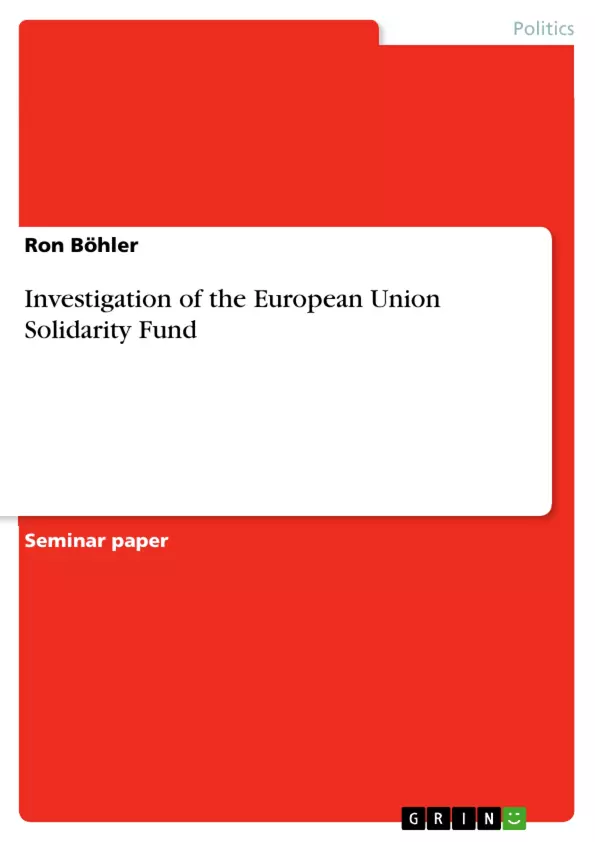The aim of this essay is it to move beyond pure evaluations of the EUSF’s efficiency and viability and to target its social dimension. The argument elaborated here is that natural hazard insurance mechanisms on the European level effectively complement national ones and that this cannot be fully explained with rational behaviour. The EUSF might be a test case for inter-European solidarity transfer payments irrespective of rational cost-benefit calculations, though it seems to share most attributes with the EU Cohesion and Regional Policy.
For decades, European unification has been illustrated ordinarily as a mere economic integration process that lacks a complementary political dimension, let alone a social one. Even more in times of the current sovereign debt crisis that continuingly bears the potential to threaten both the stability and competitiveness of a series of market economies, the European Union (EU) is expected to succeed or fail with its common Eurozone currency, the Euro. It’s the economy, stupid!, one might say.
Yet, while national governments and European policy-makers incessantly discuss about adequate ways of political steering of shattered European financial regulations, the EU has over the years installed institutions and mechanisms that shall strengthen and deepen the European project, but have only reluctantly gained academic and public attention. Much has been already written about the EU regional policy and structural funding through the European Regional Development Fund (ERDF) and the European Social Fund (ESF) as attempts to improve social cohesion within Europe.
Another institutionalised form of intra-European solidarity, in contrast, remains overall a blind spot in academic literature although its name is a clear avowal to European solidarity: the European Union Solidarity Fund (EUSF). It will be addressed here and tested a long a variety of variables to evaluate whether we can speak of a Europeanisation of solidarity mechanisms within the Community. The following subquestions will be raised: Which calculus does the European Union Solidarity Fund follow? Is it purely rationally or rather normatively motivated? Can the EUSF be considered an institution of inter-European solidarity? And if yes, who demonstrates solidarity with whom?
Inhaltsverzeichnis (Table of Contents)
- Introduction
- Natural Disaster Management & European Solidarity
- Ever closer Social Union? Towards a Framework for Analysis
- Socialising Europe: The Concept of Solidarity
- Europeanising the 'Social': A Theoretical Framework
- The European Union Solidarity Fund: Facts and Figures
- Roots, Development and Objectives
- Reform Efforts and Future Prospects
- Budget and Performance
- The European Union Solidarity Fund assessed
- Motive
- Steering & Modus Operandi
- Institutionalisation
- Conclusion
Zielsetzung und Themenschwerpunkte (Objectives and Key Themes)
This research paper examines the European Union Solidarity Fund (EUSF) and analyzes whether it can be considered a manifestation of European solidarity. It aims to move beyond a purely efficiency-based analysis of the fund and explore its social dimension.
- The role of the EUSF in responding to natural disasters
- The concept of solidarity within the European Union
- The EUSF's potential as a mechanism for inter-European solidarity transfer payments
- The effectiveness of the EUSF as a complement to national disaster insurance mechanisms
- The institutionalization of solidarity within the European Union
Zusammenfassung der Kapitel (Chapter Summaries)
- Introduction: Introduces the research paper's focus on the EUSF and its potential to embody European solidarity. It sets the stage for subsequent analysis by highlighting the importance of solidarity in the context of the European Union.
- Natural Disaster Management & European Solidarity: Discusses the increasing frequency of natural disasters in Europe and emphasizes the need for supranational action based on solidarity. It argues that the EUSF represents a transfer of natural hazard insurance systems from the national to the European level.
- Ever closer Social Union? Towards a Framework for Analysis: Develops a theoretical framework for understanding European solidarity by examining the concept of solidarity and its application to the European context. It provides a theoretical lens for analyzing the EUSF within the broader framework of European integration.
- The European Union Solidarity Fund: Facts and Figures: Explores the history, objectives, and performance of the EUSF. It examines the fund's roots, development, budget, and potential for reform.
- The European Union Solidarity Fund assessed: Analyzes the EUSF in terms of its motive, steering mechanism, modus operandi, and institutionalization. This section aims to provide a comprehensive assessment of the EUSF's role in promoting solidarity within the EU.
Schlüsselwörter (Keywords)
This research paper explores key themes and concepts related to European solidarity, natural disaster management, the European Union Solidarity Fund, and the Europeanisation of solidarity mechanisms. It examines the fund's role as a tool for inter-European solidarity transfer payments, highlighting its social dimension and potential for complementing national insurance mechanisms. The study also considers the broader implications of the EUSF for the development of a more integrated and cohesive European Union.
Frequently Asked Questions
What is the European Union Solidarity Fund (EUSF)?
The EUSF is an institutionalized mechanism designed to provide financial aid to EU member states and candidate countries in the event of major natural disasters.
Is the EUSF purely based on rational economic calculations?
The research suggests it moves beyond pure rationality. It serves as a test case for inter-European solidarity, where transfers occur regardless of strict cost-benefit analyses.
How does the EUSF relate to EU Cohesion Policy?
The EUSF shares many attributes with Regional and Cohesion policies, as it aims to strengthen social cohesion and provide a safety net across the Community.
What are the main objectives of the fund?
Its primary goals are to demonstrate solidarity by helping to restore infrastructure, provide emergency services, and cover the costs of relief operations after disasters.
Who demonstrates solidarity with whom through the EUSF?
It is a mechanism of supranational solidarity where the European Community as a whole supports individual regions or nations hit by unforeseen natural hazards.
- Citation du texte
- Ron Böhler (Auteur), 2012, Investigation of the European Union Solidarity Fund, Munich, GRIN Verlag, https://www.grin.com/document/376559



